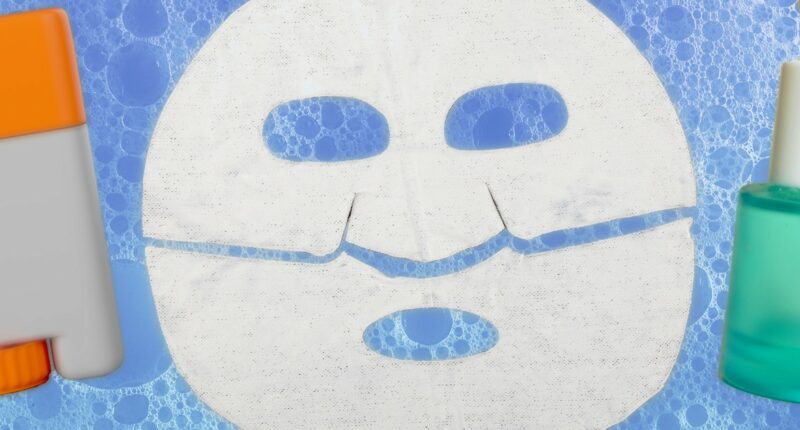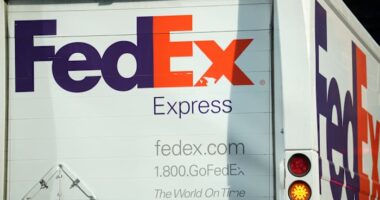Share this @internewscast.com
Mackenzie Knight recently spent $100 on Beauty of Joseon sunscreens and other sought-after Korean skincare items from YesStyle, a large e-commerce platform for K-beauty products. To her surprise, five days post-purchase, she received an email from DHL, a prominent global shipping company, informing her of a $20 tariff charge. The notice specified that she had a five-day window to pay, or her order would be sent back.
This unexpected charge stunned Knight, as she explained to NBC News. The YesStyle website did not warn customers about any additional charges due to the cessation of the de minimis tariff exemption, a policy change implemented by the administration of President Donald Trump last week, affecting lower-value shipments.
“I’m thankful that I can afford the extra $20, but it was still an unwelcome surprise,” said Knight, 35, residing in San Jose, California. “It would be beneficial if customers were informed about potential tariffs, maybe through a tool or calculator.”
Fans of Korean beauty products such as cleansing oils, snail mucin, and highly protective sunscreens compared to those available in the U.S. might need to brace themselves as these changes could increase their final checkout prices.
The previously existing de minimis rule allowed imports of goods valued at under $800 to enter tax-free but now subjects them to either standard U.S. tariff rates based on their country of origin or fixed fees ranging from $80 to $200, with the latter being applicable for only six months.
South Korea, for example, was subject to a 15% reciprocal tariff starting this summer.
The removal of this exemption, alongside the latest tariff-level changes, has significantly impacted the Korean beauty market, which has seen considerable growth in the U.S. over the last ten years.
The U.S. imported an estimated $1.7 billion worth of K-beauty products in 2024, a more than 50% increase from the previous year, according to data from the U.S. International Trade Commission.
While tariffs disrupt global supply chains, the removal of the de minimis provision affects shipments of low-value items such as small electronics and skin care and beauty products, said Munseob Lee, an economist at the University of California San Diego.
In the short run, he said, K-beauty consumers could face “higher prices, fewer varieties and longer delivery times.”
Eliminating the de minimis exemption could cost the average American family up to $136 a year, the heaviest impact falling on low-income and minority consumers who rely on affordable imports, according to a February report from the Yale Economic Growth Center.
Lee said the full impact of the de minimis change on the K-beauty industry may not be clear until next year, as many shoppers and retailers have stocked up on inventory to brace for higher tariff costs.
At the moment, he said, it’s difficult to determine exact price increases because sellers may adopt different strategies to offset costs. Bigger retailers may have the market power to pass on duties to consumers, but smaller brands may have to suspend deliveries to U.S. shoppers, he said.
The impact of global tariffs and ending the de minimis exemption is not limited to the Korean beauty industry. Santiago Vance, who buys Japanese beauty products, said online retailers like Wabi-Sabi and Yoyo Japan have stopped shipping her go-to stem cell serums to the U.S.
“I really am disappointed in how cruel this administration is to normal people,” she said. “We don’t buy a lot. Most of us never even went over the de minimis amount that was there already.”
Congress had planned to remove the tariff exemption for all countries in July 2027, but Trump signed an executive order expediting the end date to Aug. 29. The same day, K-beauty retailer Olive Young imposed a 15% customs duty on all U.S. orders to offset the 15% tax on South Korean imports that went into effect Aug 1.
“We just accepted the reality that this year is going to be one of the most unprofitable years,” said Liah Yoo, a beauty influencer and the founder of the U.S.-based K-beauty brand Krave Beauty.
Because Krave Beauty has a U.S.-based distribution center and doesn’t ship finished products from Korea, Yoo said, the de minimis exemption doesn’t affect her business as much as the direct import tariffs have. Her packaging and operational costs have increased, but Yoo said she’s holding off on hiking prices due to ongoing geopolitical uncertainty.
“The last thing I want to do is increase prices then backtrack because trade policy changed again,” she said. “Hopefully by the end of year there’ll be something more set in stone.”











